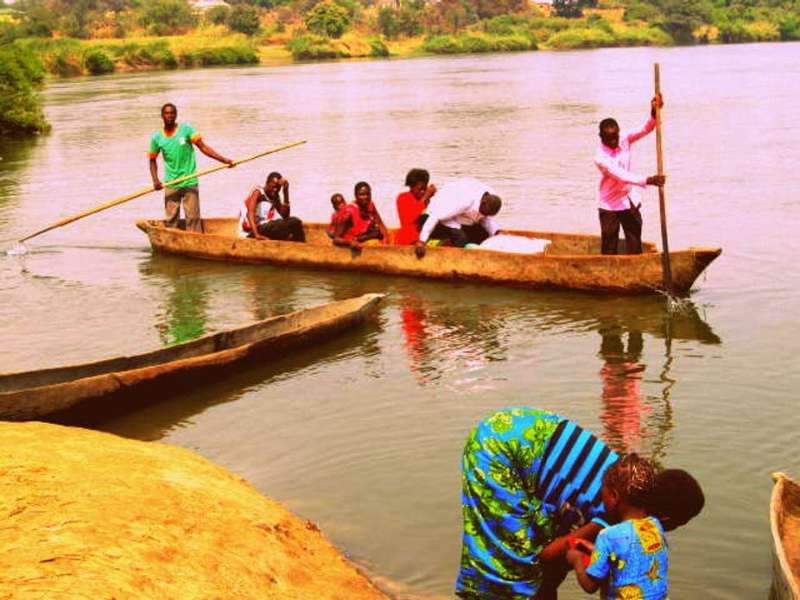A small boat carries passengers across the Zambezi river. Credit: Wikimedia Commons
Malawi's landlocked status places a huge burden on its economy. This makes imports and exports expensive. Because of time-consuming and poor-quality rail and road transport, the country's transport costs are among the highest in Africa.
The search for a solution has dominated Malawi's foreign policy since independence in 1964. Malawi relies on four main trade corridors: the ports of Dar es Salaam in Tanzania; Beira and Nacala in Mozambique and Durban in South Africa.
An alternative route is a waterway to the Indian Ocean through Mozambique. It was first proposed in 1891. The now controversial idea was revived in 2005 by Malawi's third president, Bingu wa Mutharika (2004-2012) as a signature foreign policy project. It was known as the Shire-Zambezi Waterway.
Believing it would be an important legacy of his presidency, he consistently claimed that using the route from Nsanje in Malawi to Chinde in Mozambique would drastically reduce Malawi's transport costs and boost economic growth.
Malawi's main exports are tobacco, tea, sugar. It imports oils, consumer goods and fertilisers.
But Malawi has so far failed to get access to the Indian Ocean. Our research suggests this is because of two important factors: Malawi's diplomatic strategy and the absence of Mozambique's buy-in.
We found that for the project to happen, Malawi must change its diplomatic approach and the two countries must ensure that their national interests in the project are closely aligned.
Yet there may be renewed hope for the project. This is because there are recent signs that the two countries do in fact have interests in common and can collaborate on a project.
The Shire-Zambezi waterway
Malawi's diplomatic relations with Mozambique have not been harmonious since independence. Historically, Malawi was aligned to apartheid South Africa, which provided support to the Renamo rebel movement during Mozambique's 16-year civil war.
Mozambique's leaders therefore showed little interest in Mutharika's vision of a waterway running through its territory. The other factor was Mozambique would likely lose out on the toll or freight charges for foreign vehicles that use its transport network. Instead, in 2009 they announced plans to rehabilitate the port of Beira, rather than Chinde's, and improve the country's road network.
Still, Mutharika pursued the waterway project. First, beginning in 2005, he sought support from other African leaders at meetings of the African Union, Southern African Development Community (SADC) and New Partnership For Africa's Development (NEPAD).
Second, he bolstered the credibility of the project by formally and informally including Zambia, Zimbabwe and the Democratic Republic of Congo. As a former Secretary General of the Preferential Trade Area of East and Central Africa (PTA), he believed that a regional integration component would win his project favour.
Third, Mutharika insisted that the project be completed quickly, even in the absence of Mozambican approval. He may have reasoned that if he demonstrated his commitment, Mozambique would be forced to comply for the sake of neighbourly relations.
Megaphone diplomacy
Mutharika's strategy demonstrated the shortcomings of "megaphone diplomacy" in international relations. Megaphone diplomacy is generally understood as the use of mass media to advance contentious diplomatic aims. This is the opposite of "quiet diplomacy" through traditional diplomatic channels.
Without consulting the Mozambican government and after almost a year in power, Mutharika organised a highly publicised groundbreaking ceremony in Nsanje port in southern Malawi in October 2005. Subsequently, his administration engaged a private Portuguese company to begin phase one of the construction of the port.
This phase was quickly completed and Mutharika's government went ahead to publicise the official opening of the waterway. Billboards went up across the country emblazoned with the words
"The dream becomes reality: Nsanje Port opens October 2010".
The presidents of Zambia and Zimbabwe were invited to the public ceremony to celebrate the planned arrival of a barge carrying 60 tonnes of imported fertiliser. Mozambican authorities, however, impounded the barge and detained four Malawians for navigating the river without authorisation.
Mozambique objected to the project on grounds that no economic feasibility study or environmental impact assessment had been carried out. It also claimed that Malawi had not even requested official clearance of the barge.
The final blow for Malawi's diplomatic debacle was the publication of the feasibility report commissioned by the SADC. The 2013 report concluded that the project is
"technically feasible but not financially viable."
Although the waterway is Malawi's shortest route to the sea, the report concluded that only 273,200 tonnes per year could be transported through the waterway. Annual dredging and removal of aquatic plants would cost 80 million US dollars per year, the report further said.
Mozambican response
The report provided a legitimate reason for Mozambique's withdrawal from the project, but failed diplomacy undoubtedly led to the collapse of the waterway project. Mozambique was operating from a position of power as it controls access to the sea. And it was unlikely to benefit much from the Shire-Zambezi Waterway. If Malawi changes its diplomatic approach, the project may ultimately see the light of day.
Indeed, Malawi's tactics appeared to reinforce Mozambique's opposition to the project, which it felt undermined its national interests.
In recent months, Malawi's current president Peter Mutharika (Bingu Mutharika's brother) has been drumming up support for the project again. Mozambique continues to ignore such signals.
But the two countries recently signed an agreement that will allow the Electricity Supply Corporation of Malawi to purchase 200 megawatts of power from Mozambique starting in 2022. This is a clear case of a successful partnership with both countries sharing a common national interest on power generation and supply.
Despite the African Union's talk of globalisation, regional integration and partnerships, national interest continues to rule in international diplomacy. For the Shire-Zambezi project to go ahead, Malawi and Mozambique must have a frank discussion about how they could both benefit from it.
Provided by The Conversation
This article is republished from The Conversation under a Creative Commons license. Read the original article.![]()






















